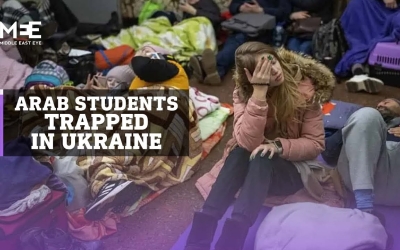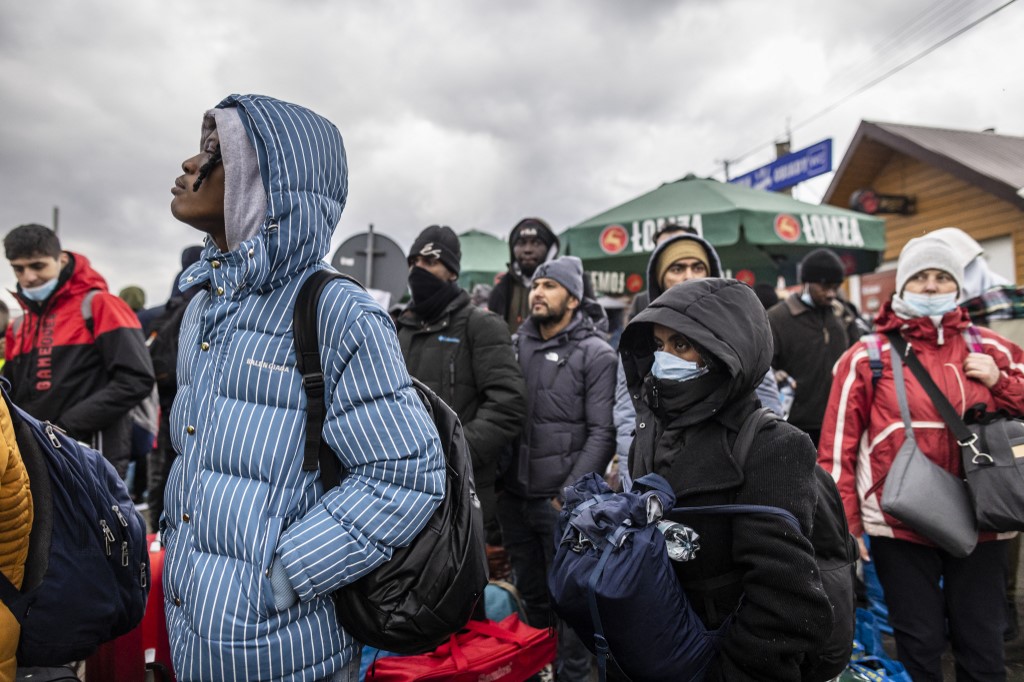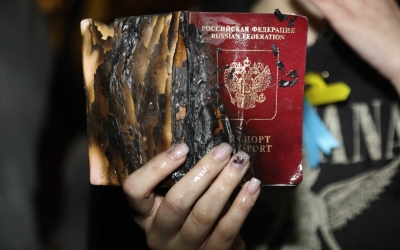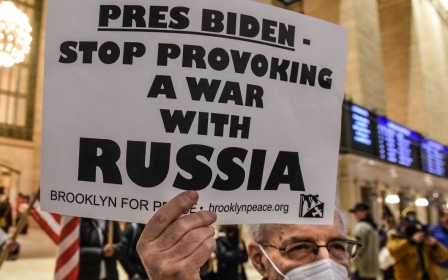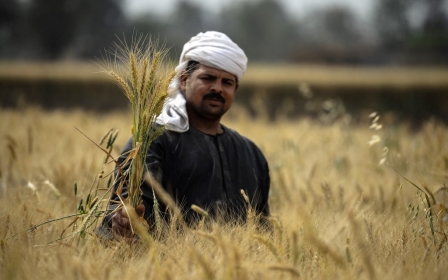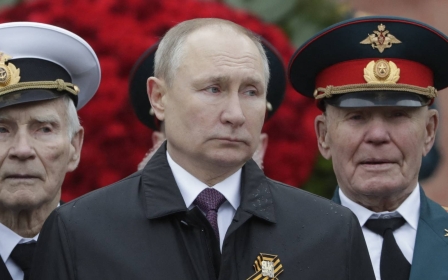Russia-Ukraine war: Palestinian citizens of Israel seek safety after being 'abandoned' by government
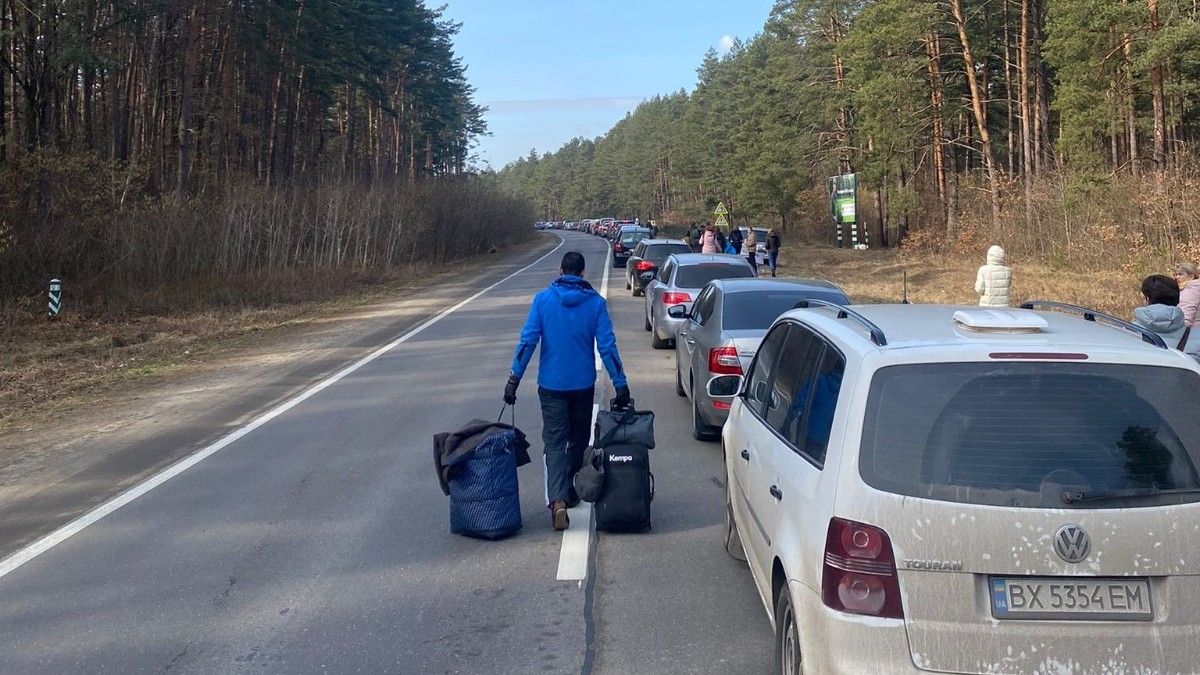
Malek Yunis, a university student who has lived in Kharkiv, Ukraine’s second city, for the past five years, had been eagerly anticipating his graduation from medical school in September, and his subsequent return to his hometown of Arara, a Palestinian village in northern Israel.
But when Russia invaded Ukraine last week, his only thought was reaching safety.
'Before leaving the shelters in Kharkiv, we went to the Israeli embassy in Lviv, but they didn’t help us secure our evacuation'
- Malek Yunis, student
Malek’s situation is not unique, however. Nearly 2,000 Palestinian students with Israeli citizenship are now stranded in Ukraine and forced to make a choice between their education and safety as Ukraine's universities refuse to allow their students to continue their studies abroad via Zoom under threat of repeating the academic year if they left.
Yunis and fellow medical students hid in shelters as the first Russian air strikes tore through the city.
“Kharkiv has become a ghost town,” he told Middle East Eye over the phone.
New MEE newsletter: Jerusalem Dispatch
Sign up to get the latest insights and analysis on Israel-Palestine, alongside Turkey Unpacked and other MEE newsletters
“In the early hours [of the invasion], we expected that the Russians would only launch a few warning shots, but we later came to realise that a full-blown war was at hand, and no one was able to predict how it would evolve.”
Limited help
Due to the uncertainty of the situation, Yunis and other students decided to flee Kharkiv. They left their rented apartments and most of their belongings, taking only a few essentials and some food for the road.
They left in buses on a journey laden with danger towards the border with Moldova. It took them 48 hours in the freezing cold to reach their destination as Russian warplanes flew above them.
The Ukrainian-Moldovan border was the site of a “human river of Ukrainians, foreigners, and Muslim and Arab immigrants, all fleeing the war but coming up against the border,” said Yunis.
He and 110 other students waited for 16 hours in the hope of being taken to a safe place, but to no avail.
Things took a turn for the worse when Russian air strikes started targeting Ukraine’s large cities, and the border crossings shut down.
“Before leaving the shelters in Kharkiv, we went to the Israeli embassy in Lviv, but they didn’t help us secure our evacuation,” Yunis said.
Despite the tragedy of war, the resulting paralysis to Ukraine’s economy, and subsequent nationwide shortages of heating, electricity, water, and food, Yunis and his companions found succour among Ukrainians, who opened their doors to them and provided them with all manner of assistance.
Official Israeli assistance to Palestinian citizens of Israel living in Ukraine has been less forthcoming, being limited to “instructions and advice put out by the Israeli Ministry of Foreign Affairs and the Tel Aviv consulate in Lviv for us to take trains or buses or private cars out of Kyiv and all other major Ukrainian cities and to head towards the borders,” according to Yunis.
“They basically admitted their inability to offer us any means of evacuation in light of the war,” he added.
Given that Israeli instructions were limited to advising Israeli citizens to head to Ukraine’s border crossings with Poland, Romania, Hungary, Slovakia, and Moldova, the abandoned Palestinians took matters into their own hands.
Yunis said that they have established communication networks using Whatsapp and Telegram to “create a virtual haven that may help us in finding a physical one”.
As the Russian invasion was underway, Israel called on its citizens to evacuate and said it had mobilised to assist those who wanted to leave. Israeli Foreign Minister Yair Lapid said that consular representatives have been stationed at all border crossings near Lviv to assist Israelis leaving the country.
A statement by the Israeli foreign ministry said that on Thursday some 500 Israelis evacuated Ukraine on three buses the embassy had organised to take them from Lviv to Poland.
Intense anxiety
Ali Shahwan, another Palestinian student from the village of Iksa near Nazareth, has experienced similar hardships alongside a hundred of his fellow students stranded in the south-central city of Dnipro. He was supposed to graduate from medical school in May.
'We took flight into the unknown over the course of 48 hours'
- Ali Shahwan, student
He and his companions lived through several days of intense anxiety and trepidation, especially after Ukrainian universities refused to allow them to return to their countries and continue their education remotely, insisting that teaching will remain in-person and threatening punitive action against any absent students.
“Arab students went to the Israeli consulate two weeks before the outbreak of the war, asking it to intervene with the universities on their behalf to allow students, especially those in their final year, to leave Ukraine and return to their homes to continue their studies remotely,” Shahwan told MEE.
There was no serious Israeli response, he said, which meant that his graduation would be delayed by several months.
According to Shahwan, all Arab students in the country “have been living through anxiety over their education and their futures in higher education, and they have chosen to take the gamble of remaining in Ukraine, putting their lives at risk so that they do not lose their university education.”
Mass evacuation
On the third day of the Russian invasion of Ukraine, Shahwan and 58 of his peers searched for ways to help themselves, given the continued intransigence and inertia of the Israeli consulate which apparently was unable to evacuate them.
As hostilities escalated in major Ukrainian cities, Shahwan did not hesitate in leaving Dnipro, with hundreds of other Arabs and non-Ukrainians, in a procession of buses through a sea of traffic, as similar scenes of mass evacuations spread across Ukraine.
'Along with tens of thousands of people, we waited, for over 14 hours, in a long line on one of the crossings to Moldova. In the end, we couldn’t go through'
- Ali Shahwan, student
Buses packed with people, and rows upon rows of cars, formed bottlenecks at the border crossings.
“We took flight into the unknown over the course of 48 hours,” said Shahwan.
“We were searching for a way out, and everywhere we went there were military checkpoints, and the border crossings were unprecedentedly crowded.
“Along with tens of thousands of people, we waited, for over 14 hours, in a long line on one of the crossings to Moldova. In the end, we couldn’t go through.”
The Medyka border crossing with Poland was even worse.
There, Shahwan’s ordeal turned into a hellscape, punctuated by the dread of uncertainty. They got off the buses that stood in 10-kilometre-long queues and made for the border on foot. There, they were left out in the freezing cold, with no food or water, and no way to charge their phones.
Intervention
As foreign citizens suffer neglect from their consulates and embassies, human rights organisations and relief agencies have taken the initiative in assisting students and foreign communities, according to Ehab Khateeb, a Palestinian citizent of Israel who has lived in Kyiv for 10 years.
Khateeb said that tens of thousands of people are now living on the borders with Poland, Romania, and Moldova.
“[They] have spent many long and arduous hours in the attempt to cross to the Polish side,” he told MEE in a phone call.
“We were able to collaborate with the Palestinian relief organisation Igatha 48, and they were able to evacuate hundreds of Palestinian students with Israeli citizenship, first from the cities of Odesa and Dnipro, and then into Poland.
“Many buses also left Kharkiv and headed for Moldova, and were able to reach the city of Iasi in Romania, and then booked flights to Ben Gurion airport in Israel.”
Khateeb noted that on both sides of Ukraine’s borders, especially the Polish and Moldovan borders, there are emergency rooms set up by the Relief Society and supported by international human rights organisations and individuals.
They have also provided some assistance for fleeing Arab students, including Palestinian citizens of Israel, Moroccans, Tunisians, Lebanese, and Jordanians.
Middle East Eye delivers independent and unrivalled coverage and analysis of the Middle East, North Africa and beyond. To learn more about republishing this content and the associated fees, please fill out this form. More about MEE can be found here.


